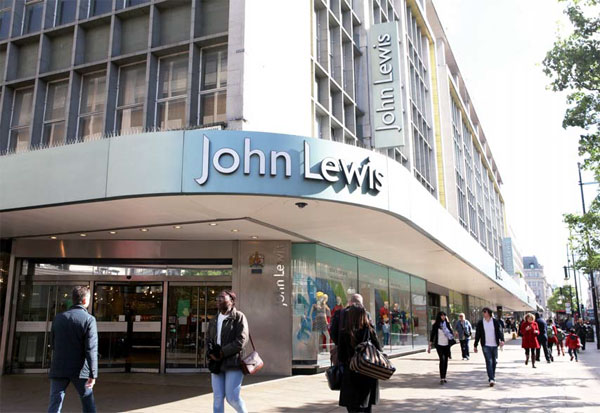Big retailer locks China in big embrace

| John Lewis sees Chinese as the biggest consumer group. Monica Wyithe / For China Daily |
| Andy Street says John Lewis' China push started three years ago when the company noticed a growing presence of Chinese shoppers in the UK. |
150-year-old British department store sees Chinese shoppers as biggest consumer group
As the famous London retailer John Lewis celebrates its 150th anniversary this year, managing director Andy Street is looking back at how the store has transformed from a local shop to a global enterprise, in which Chinese shoppers are a now major focus.
In 2013, Chinese tourists were the highest-spending nationality across all John Lewis department stores in the United Kingdom, with a spending increase of 25 percent from 2012.
"Chinese tourists have become a focus for John Lewis, because we saw how many Chinese tourists were coming to the UK, and we saw what was happening in Paris, which is a huge market for Chinese tourists," Street says.
John Lewis' China push started three years ago when the company noticed a growing presence of Chinese shoppers in the UK, he says. "We got our act together in making sure we're ready to take those Chinese customers."
John Lewis subsequently installed China UnionPay card terminals in its shops, allowing cardholders to spend without paying currency exchange fees. The store also recruited Chinese-speaking assistants to welcome Chinese shoppers.
Having done all this preparation before the Olympic Games in London in 2012, John Lewis benefited greatly from the influx of Chinese shoppers at that time.
The Olympics made a name for John Lewis in the minds of Chinese tourists, and this helped the store gain a surge in Chinese shoppers in the year after the Games. In the first six months of 2013, Chinese shoppers in the UK spent 51 percent more than they did in the same period in 2012.
That increase was stunning, considering John Lewis does not advertise in China.
In addition, John Lewis retail director Andrew Murphy is now the chairman of UK China Visa Alliance, an organization established in 2013 to lobby the British government to make it easier for Chinese to obtain visas.
Street says the selection of Murphy as chairman reflects John Lewis' reputation in the UK retail landscape.
"John Lewis has been a responsible and reasonable business. And I think the whole tradition of John Lewis over the years is that we have often stepped forward when there is a political or business issue. It was not a surprise to anybody that we should be the organization that steps forward."
The alliance, which consists of many top British retailers and entertainment organizations, argued that the difficulty Chinese visitors faces in obtaining visas to visit the UK was harming the British economy.
As a result, more Chinese tourists applied for visas to the passport-free Schengen area, whose a single visa allows entry to 26 countries. The alliance asked the British government to streamline the UK visa application process with Schengen.
The alliance's efforts encouraged the British government to simplify visas for Chinese visitors.
When British Chancellor of the Exchequer George Osborne visited China last October, he announced that under new regulations Chinese nationals visiting the EU will not need to submit separate UK visa applications if they book with particular travel agents.
Street says the announcement represents progress. It is the job of the alliance to work with the government in aligning the UK and Schengen applications as much as possible, but the alliance also recognises that the UK will not be a part of Schengen so in most cases separate applications will be required, he says.
"The government has given a commitment that the process has been aligned. We are not a part of Schengen and the visa alliance is working within the rules as they are."
The alliance does not just work for retailers, but as a catalyst to strengthen UK-China business links, he says.
"It's actually a much deeper shift. It's actually saying these two countries need to do more business together. It's an advantage that more Chinese people travel to Britain, understand our culture, understand what we can offer."
Chinese shoppers at John Lewis stores are very brand conscious, Street says.
"The natural thing would be big brand names, but what they are particularly interested in is finding British brands that are perhaps not available everywhere, like Cath Kidston."
Cath Kidston, a British lifestyle brand known for its iconic floral prints, was founded in 1993 when designer Cath Kidston opened the first shop in west London. The brand opened a flagship store in Shanghai last year, but many customers still see it as exclusive and unique.
Other brands popular with Chinese shoppers at John Lewis are fashion brands Mulberry and Barbour, and the beauty brand Liz Earle, according to the group.
Apart from the brands John Lewis sells, Street says its own brands are becoming more popular with Chinese customers, who "increasingly understand that John Lewis brands can be very good value for money".
Compared to London's up-market stores Harrods and Selfridges, prices for similar products at John Lewis are slightly lower without any compromise on quality. As not all Chinese shoppers abroad demand the most expensive and exclusive items, John Lewis has turned out to be a suitable alternative.
"Our whole positioning is as an understated brand, a brand that is sold on quality and great value for money," Street says. "We are not as strong in luxury products. I think increasingly Chinese customers get the reliability of the brand here."
Apart from price, John Lewis is also strong on home products and electrical appliances, while Harrods and Selfridges focus much more on fashion brands.
Street says this can be another big advantage for John Lewis, especially as many of its home products, such as bedding and textiles, are produced at its own factory in northern England, so the products are seen as heritage items.
"If you look at what international tourists buy, they love some of our homeware products, and a lot of those are made in Britain. All those designs and qualities are very good."
He says the "made in Britain" label certainly adds appeal. "That's a part of the attraction. It's really seeing the level of quality and the level of good design."
Apart from manufacturing its own products, John Lewis also buys many of its products overseas, especially in China, an arrangement that began before World War II.
Products imported from China now include clothes, home products, furniture and technology items, many of which are Western brands manufactured in China.
Street says the fact China has been a primary sourcing country for John Lewis for almost a century but is now also a focus market for its retail reach shows China's changing role in the world.
"It is the maturation of the economy from being the workshop of the world to being the consumer of the world, which is the same with what has happened in (the UK)."
John Lewis' first shop opened in Oxford Street, London, in 1864. After 150 years of growth, the store has developed a large network of overseas shops and now has a strong global online presence.
In the 2013-14 financial year, the group's turnover was 10.2 billion pounds ($17 billion, 12 billion euros). In 2012, it established its first physical store overseas, in a tie-up with premium South Korean department store Shinsegae.
Street says John Lewis is on the lookout for suitable international locations to establish more overseas stores, and many fast-growing Asian countries are being considered, but not China.
Despite the affluence of many consumers in China, the country's department store culture has not yet caught up with John Lewis' home market, so it would be difficult to introduce the company's brand and values there, he says.
"If you look at Chinese department stores, they are not providing full service as stores in South Korea, for example. So it's about how department stores operate in China. They are not ready yet."
Wang Shiyu contributed to this story.
Contact the writers through cecily.liu@chinadaily.com.cn
(China Daily European Weekly 04/25/2014 page21)
Today's Top News
- Takaichi must stop rubbing salt in wounds, retract Taiwan remarks
- Millions vie for civil service jobs
- Chinese landmark trade corridor handles over 5m TEUs
- China holds first national civil service exam since raising eligibility age cap
- Xi's article on CPC self-reform to be published
- Xi stresses improving long-term mechanisms for cyberspace governance
































